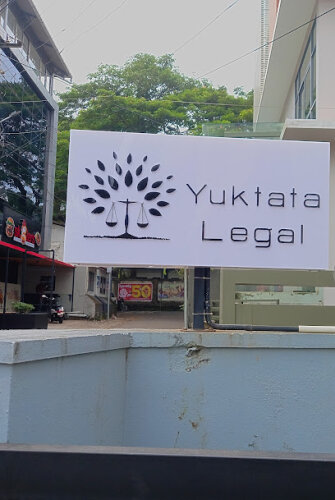Best Work Permit Lawyers in India
Share your needs with us, get contacted by law firms.
Free. Takes 2 min.
Or refine your search by selecting a city:
List of the best lawyers in India
About Work Permit Law in India
Work permits in India are primarily governed by the Indian immigration and employment laws, which are designed to regulate the entry, stay, and employment of foreign nationals in the country. Foreign nationals seeking to work in India typically require a suitable employment visa, which acts as a work permit. The work permit law ensures that foreign workers adhere to the conditions stipulated in their visas and do not violate any Indian labor regulations. The issuance and management of these permits are overseen by the Ministry of Home Affairs and Ministry of Labor and Employment in India.
Why You May Need a Lawyer
Obtaining a work permit in India can be a complex process due to the various regulations and documentations required. Here are some common situations where you may need legal assistance:
- Understanding the eligibility criteria for different types of work visas.
- Assistance with the application process and ensuring all documentation is in order.
- Handling issues related to visa rejections, renewals, or cancellations.
- Navigating legal issues related to employment contracts or labor disputes.
- Ensuring compliance with Indian labor laws and avoiding potential legal pitfalls.
Local Laws Overview
The primary piece of legislation governing work permits in India includes various provisions under immigration and labor laws. Key aspects to consider include:
- Visa Categories: Employment Visa (E-Visa) is the most relevant category for work permits, designed for highly skilled foreign nationals employed by an Indian entity or multinational group.
- Eligibility: Must possess specialized skills or be at a senior level. Employment can only be in sectors permitted by the Indian government.
- Documentation: Valid passport, employment contract, proof of company registration, and academic qualifications are typically required.
- Duration and Renewal: Employment visas are generally valid for up to 1 year or the term of the contract, whichever is lesser, and can often be renewed or extended.
- Compliance Obligations: Foreign nationals must comply with Indian labor laws and taxation regulations applicable to their employment status.
Frequently Asked Questions
What is a work permit in India?
A work permit in India, generally referred to as an employment visa, allows foreign nationals to work legally in the country under specified conditions.
Who is eligible to apply for a work permit in India?
Eligibility is typically for highly skilled professionals or those in senior management roles who have a valid employment offer from an organization in India.
What documents are required for a work permit application?
You will need a valid passport, an employment contract, proof of qualifications, proof of the employer's registration, and additional documentation depending on specific visa requirements.
How long does it take to process a work permit in India?
The processing time for a work permit can vary but typically ranges from 2 to 6 weeks, depending on the completeness of documentation and specifics of the application.
Can a work permit be renewed in India?
Yes, a work permit can often be renewed, provided the applicant meets the eligibility criteria, and their work assignment continues as per the contract.
What is the validity of a work permit in India?
An employment visa is usually valid for up to one year or the term of the employment contract, whichever is shorter. It is renewable on application.
Are there specific industries where work permits are not granted?
Yes, employment visas are not granted for routine, ordinary, or secretarial/clerical jobs, and employment is restricted in certain sensitive sectors.
Can family members accompany the holder of a work permit?
Family members can apply for a dependent visa, which allows them to accompany the primary visa holder. However, they are not permitted to work in India.
What are the consequences of working without a proper work permit?
Working without a valid work permit can result in fines, deportation, and bans on future entry into India.
How can one appeal a rejected work permit application?
Rejections can be appealed by addressing the deficiencies stated in the rejection notice and reapplying, often with the assistance of legal counsel to ensure compliance.
Additional Resources
Here are some recommended resources for those seeking information about work permits in India:
- Ministry of Home Affairs, Government of India: Oversees visa and immigration regulations.
- Ministry of Labor and Employment, Government of India: Provides guidelines on labor standards and employment conditions.
- Embassy or Consulate of India in your country: Provides specific applications and information regarding visa processing.
- Legal Aid or Immigration Consultants: Professionals who can offer more personalized advice and assistance.
Next Steps
If you require legal assistance in obtaining a work permit in India, consider the following steps:
- Consult with an immigration lawyer or a legal firm specializing in work permits and visas.
- Gather all necessary documents required for your visa application process.
- Schedule consultations to discuss your eligibility and best approach for your application.
- Stay informed about any changes in visa laws or regulations that might affect your application.
- Utilize additional resources such as governmental portals or immigration specialists to ensure compliance and facilitate the approval process.
Lawzana helps you find the best lawyers and law firms in India through a curated and pre-screened list of qualified legal professionals. Our platform offers rankings and detailed profiles of attorneys and law firms, allowing you to compare based on practice areas, including Work Permit, experience, and client feedback.
Each profile includes a description of the firm's areas of practice, client reviews, team members and partners, year of establishment, spoken languages, office locations, contact information, social media presence, and any published articles or resources. Most firms on our platform speak English and are experienced in both local and international legal matters.
Get a quote from top-rated law firms in India — quickly, securely, and without unnecessary hassle.
Disclaimer:
The information provided on this page is for general informational purposes only and does not constitute legal advice. While we strive to ensure the accuracy and relevance of the content, legal information may change over time, and interpretations of the law can vary. You should always consult with a qualified legal professional for advice specific to your situation.
We disclaim all liability for actions taken or not taken based on the content of this page. If you believe any information is incorrect or outdated, please contact us, and we will review and update it where appropriate.
Browse work permit law firms by city in India
Refine your search by selecting a city.
















